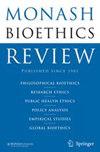遵从还是批判性参与:医疗从业人员应如何使用临床伦理指南?
IF 1.6
Q2 ETHICS
引用次数: 0
摘要
医疗从业人员可以获得一系列伦理指导。然而,这些指导在伦理决策中的规范作用却未得到充分探讨。本文探讨了医疗从业人员对待伦理指导的两种方式。我们首先概述了服从伦理指导的观点,说明服从的态度如何引发三个关键问题:道德价值、道德理解和道德错误。然后,我们借鉴哲学文献,主张将伦理指导作为同事道德见证的一种形式,并建议以 "批判性参与 "的精神而非敬畏的态度对待伦理指导,这是一种更有前途的态度。本文章由计算机程序翻译,如有差异,请以英文原文为准。
Deference or critical engagement: how should healthcare practitioners use clinical ethics guidance?
Healthcare practitioners have access to a range of ethical guidance. However, the normative role of this guidance in ethical decision-making is underexplored. This paper considers two ways that healthcare practitioners could approach ethics guidance. We first outline the idea of deference to ethics guidance, showing how an attitude of deference raises three key problems: moral value; moral understanding; and moral error. Drawing on philosophical literature, we then advocate an alternative framing of ethics guidance as a form of moral testimony by colleagues and suggest that a more promising attitude to ethics guidance is to approach it in the spirit of 'critical engagement' rather than deference.
求助全文
通过发布文献求助,成功后即可免费获取论文全文。
去求助
来源期刊

Monash Bioethics Review
ETHICS-
CiteScore
2.70
自引率
6.20%
发文量
16
期刊介绍:
Monash Bioethics Review provides comprehensive coverage of traditional topics and emerging issues in bioethics. The Journal is especially concerned with empirically-informed philosophical bioethical analysis with policy relevance. Monash Bioethics Review also regularly publishes empirical studies providing explicit ethical analysis and/or with significant ethical or policy implications. Produced by the Monash University Centre for Human Bioethics since 1981 (originally as Bioethics News), Monash Bioethics Review is the oldest peer reviewed bioethics journal based in Australia–and one of the oldest bioethics journals in the world.
An international forum for empirically-informed philosophical bioethical analysis with policy relevance.
Includes empirical studies providing explicit ethical analysis and/or with significant ethical or policy implications.
One of the oldest bioethics journals, produced by a world-leading bioethics centre.
Publishes papers up to 13,000 words in length.
Unique New Feature: All Articles Open for Commentary
 求助内容:
求助内容: 应助结果提醒方式:
应助结果提醒方式:


